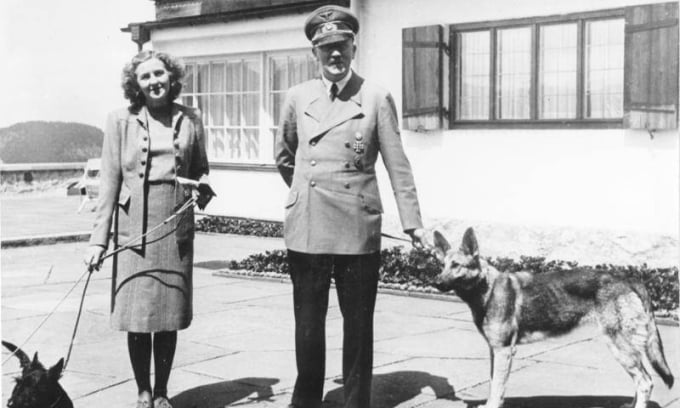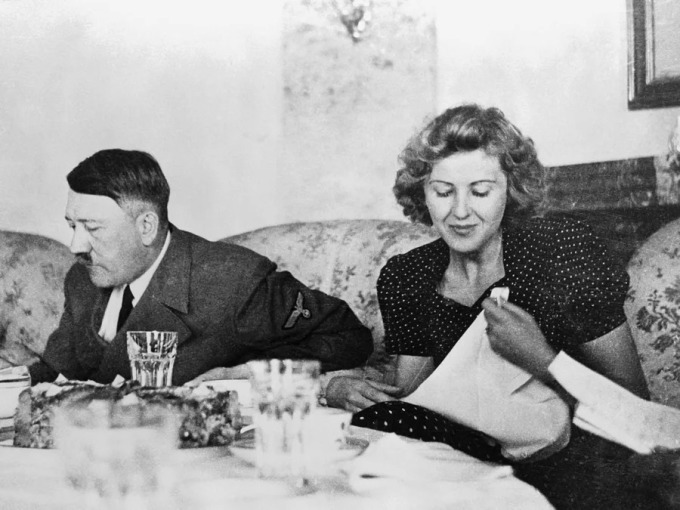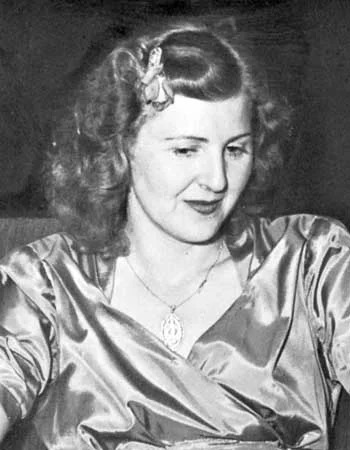Eva Braun, the wife of Nazi leader Hitler in his final hours, wished to remain beautiful even in death.
On April 30, 1945, as World War II drew to a close with the defeat of Nazi Germany, Hitler and Eva Braun woke up at 6 a.m. in their bunker in central Berlin. At noon, the Nazi propaganda minister Joseph Goebbels suggested they both leave the city, but Hitler refused.
After 3 PM, Hitler and Braun said their final goodbyes to friends and family before going into the dining room. At 3:28 PM, Braun died after taking poison. At 3:30 PM, Hitler committed suicide by gunshot. That night, the Soviet Red Army hoisted its flag atop the German parliament building.

German Nazi leader Adolf Hitler and Eva Braun at the Berghof villa in Bavaria in 1942. Photo: Deutsches Bundesarchiv
Two days earlier, Eva Braun and Hitler had married in a simple ceremony in the bunker. During lunch on April 29th with his wife and several secretaries, the Nazi leader said: "I will never allow myself to fall into the hands of the enemy, alive or dead. I will order my body cremated so that no one can find it."
Then, Hitler discussed how he should commit suicide and asked his personal physician, Werner Haase, for suggestions. "The best way is to shoot yourself in the throat. Your skull will shatter, and you won't feel anything. Death will come instantly," Hitler remarked.
Braun was horrified. She replied to her husband, "I want to be a beautiful corpse. I'll drink poison," according to the book Eva Braun: Life with Hitler by German historian Heike B. Görtemaker and Hitler's Last Day: Minute by Minute by authors Emma Craigie and Jonathan Mayo.
Braun then showed the secretaries a small copper box containing cyanide poison that she kept in her dress pocket. "I don't know if it will hurt much. I'm afraid of suffering for too long. I'm willing to die heroically, but at least it has to be painless," she continued.
"Don't worry, my nervous and respiratory systems will be paralyzed in just a few seconds," Hitler assured his wife.
Before committing suicide, Braun skipped lunch. She stayed in her room with her maid, choosing the last outfit of her life: a black dress with white roses around the neck – the dress Hitler wanted her to wear.
Death ultimately came exactly as the couple wished. Hitler, 56, and his 33-year-old wife were cremated by their close associates in the garden of the Chancellery . Dr. Haase and other close associates of Hitler were arrested by the Soviet Union on May 2, 1945. Haase died in prison in 1950 from tuberculosis.

Nazi leader Hitler and Eva Braun. Photo: Bettmann
Braun was born in 1912 into a struggling family in Munich. During the turbulent years following World War I, her parents divorced but later reconciled, possibly for financial reasons. The family's finances were very limited.
At age 17, Braun worked in the studio of Nazi German photographer Heinrich Hoffmann in Munich, where she was occasionally photographed as a model. This studio was where she first met Hitler, then a radical politician.
Few people know exactly when the two became close, but some documents suggest that the young Braun stuffed tissues into her bra in an attempt to seduce Hitler.
In the early years of their relationship, Braun attempted suicide twice. In 1932, she shot herself in the chest. In 1935, she overdosed on sleeping pills. Braun wanted to prove to Hitler, who was 23 years older than her, the consequences of his indifference towards her.
Braun's efforts paid off. After her second suicide attempt, Hitler moved her and her sister Margarete to an apartment in Munich and later to a villa in Wasserburgerstr. By 1936, Braun was staying with Hitler at the Berghof villa in the Bavarian Alps whenever he visited.

Eva Braun in Munich in 1944. Photo: Heinrich Hoffmann
Braun's relationship with Hitler was complicated. After the war ended, staff at the Berghof villa said the two apparently did not spend the night together.
According to historian Heike Gortemaker, there is little evidence to support this claim because Hitler ordered the destruction of all private documents concerning himself. But what is certain is that Hitler wanted their relationship to remain out of public view.
The Nazi leader believed that a public relationship would be disastrous for his image. "Many women find me attractive because I am unmarried," Hitler once said. "It's the same with a movie star: When he gets married, he loses his appeal to the women who adore him. They no longer idolize him so wildly."
Therefore, Braun's true identity was always kept secret, with only a few of Hitler's closest confidants knowing about their relationship.
Hitler's treatment of Braun was rather peculiar. When guests visited the Berghof villa, Braun had to avoid them. According to an article in Die Welt , she was only occasionally allowed to appear before the guests, but even then, Hitler doted on her and gave her envelopes full of money.
Becoming Hitler's mistress brought Braun a life of luxury. She spent most of the wartime at the Berghof villa. According to some accounts, she had bad habits such as drinking and smoking, which Hitler hated.
Despite being safe in the Alps, Braun chose to go to Berlin to be with Hitler in his final days.
"Braun's decision to go to Berlin when it was already in ruins and end her life with Hitler at the age of 33 shows a deep belief, determination, and resilience. The portrayals of Braun as a superficial girl only interested in material things are completely wrong. If she had stayed in Munich, she would have had a better life," historian Gortemaker commented.
But according to a relative of Braun, her relationship with the Nazi leader was filled with suffering, and suicide was the only way for her to regain her lover's respect.
Years later, Gertraud Weisker, Braun's cousin, revealed Braun believed that her relationship with Hitler had caused a serious rift in their family. Braun only kept in contact with her sister Margarete, who also married a high-ranking Nazi official.
"Braun was incredibly unhappy. That's why she tried to end her own life twice," Weisker said. "Braun was in a relationship that could only be justified by marriage and dying together."
Vu Hoang (According to Local, NPR )
Source link

















































































![OCOP during Tet season: [Part 1] Ba Den custard apples in their 'golden season'](/_next/image?url=https%3A%2F%2Fvphoto.vietnam.vn%2Fthumb%2F402x226%2Fvietnam%2Fresource%2FIMAGE%2F2026%2F01%2F26%2F1769417540049_03-174213_554-154843.jpeg&w=3840&q=75)













Comment (0)